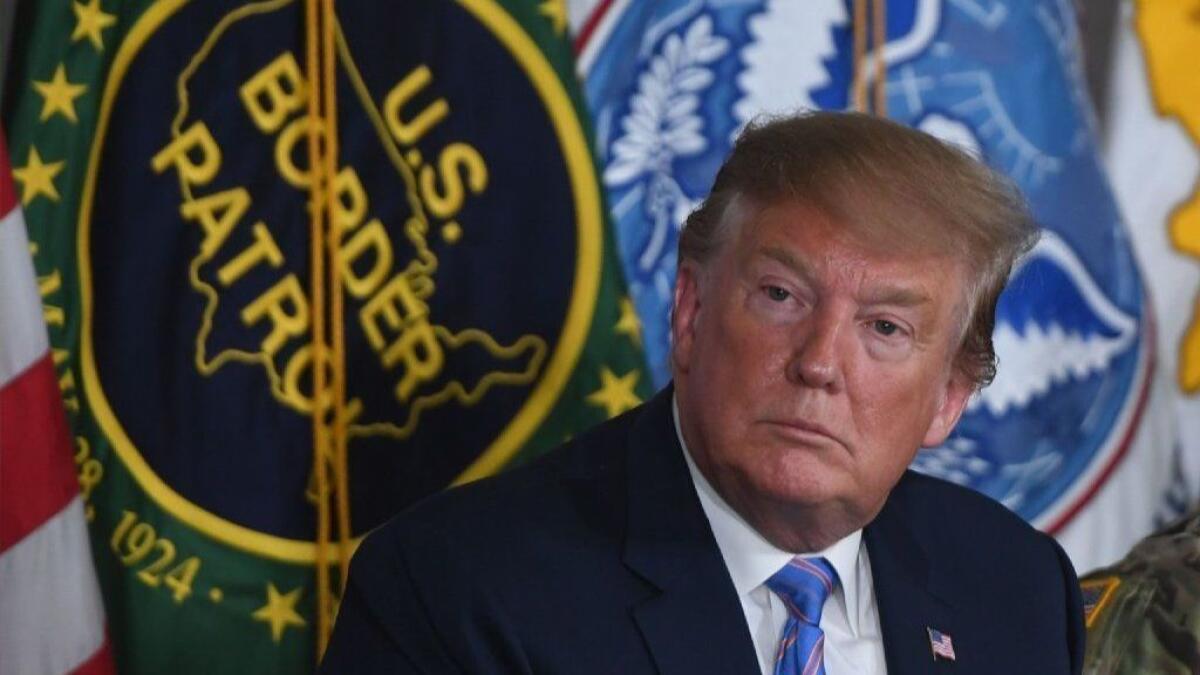Trump will pitch immigration plan already facing stiff opposition in Congress

- Share via
Reporting from Washington — President Trump will announce a sweeping immigration plan Thursday to boost border security and foreign workers while reducing family reunification, but the White House proposal has little chance of advancing in Congress.
The unveiling of the long-awaited plan, which was prepared by Jared Kushner, will not be accompanied by proposed legislation for Congress to consider, or widespread buy-in from lawmakers whose support would be necessary for it to be enacted.
Trump has similarly struggled to get Congress to back other border and immigration policies, including appropriating money to build a wall along the southern border, his signature campaign pledge. He declared a national emergency on the border to tap the Pentagon budget and other federal funds instead.
The White House framed the Kushner plan as an overdue effort to modernize the sprawling U.S. immigration system, which has defied attempts at reform for decades. Officials said more details, and a formal legislative proposal, would follow in several weeks.
Kushner, the president’s son-in-law and senior advisor, has worked on the proposal for months, consulting several outside groups and briefing conservative lawmakers, but sharing few details in public.
It faces resistance from immigration advocates and other opponents, in part because it does not address the estimated 10.7 million people illegally in the United States, or the so-called Dreamers, the estimated 800,000 migrants who were brought to the country illegally as children.
It is also competing with half a dozen bills already introduced in Congress that seek to address the recent surge of Central American families and children arriving at the southern border.
Sen. Lindsey Graham (R-S.C.), one of Trump’s closest allies in Congress, poured cold water on the White House plan even before it was announced.
“It’s not meant to be a bipartisan solution,” he said. “It’s meant to be a marker for what we want.”
The plan doesn’t include Dreamers or thousands of immigrants under Temporary Protected Status — or anything for Democrats, Graham told The Times en route to introduce his own immigration legislation.
“This is a ‘Here’s what merit-based immigration looks like under the Trump administration, here’s what border security looks like,’ which is progress,” but isn’t going to resolve the systemic problems, he said.
The proposal would shift priorities in the U.S. immigration system. It would increase the percentage of immigrants admitted on “merit” from 12% of the those receiving green cards to 57%, while making changes to the asylum process and reducing the number of people admitted based on extended family connections, according to senior administration officials who spoke on condition of anonymity.
The formula would not change total immigration levels, one official said.
“We’re not increasing it, we’re not decreasing it,” the official said. “We’re just changing the composition.”
Kushner’s plan gives priority to children and spouses, but not extended family members, and eliminates the diversity visa, in order to focus more on employment and skills-based immigration, another senior administration official said.
High-skilled professionals such as doctors or welders, as well as exceptional students, would receive preferential treatment.
“We’d like to keep the best and brightest,” the official said, describing the merit-based aspect of the proposal as a “color-blind” way to ensure people from poor and underrepresented countries can immigrate to the United States.
As for border security, the proposal would increase resources at ports of entry to enable 100% screening for all goods and people crossing the border and to enhance efforts to detect smuggling, according to the second official.
Sen. Charles E. Schumer (D-N.Y.), the Senate minority leader, rejected the plan on Wednesday, saying the White House hadn’t reached out to any Democrats to consult on it. He said that the role of Stephen Miller, an avowed immigration hardliner who is also a senior advisor to Trump, would doom the effort.
“Don’t come up with a plan that Stephen Miller rubber-stamps and say, ‘Now pass it,’” Schumer told reporters. “It’s not going to happen.”
The first administration official pushed back on the criticism, saying the plan was open to negotiations.
“Nobody’s ever put something out and people say: ‘That’s the greatest idea, let’s sign it tomorrow, let’s do a parade for you,’” the official said. “Where you start is never where you end. This is the right place to start.”
More to Read
Get the L.A. Times Politics newsletter
Deeply reported insights into legislation, politics and policy from Sacramento, Washington and beyond. In your inbox twice per week.
You may occasionally receive promotional content from the Los Angeles Times.












